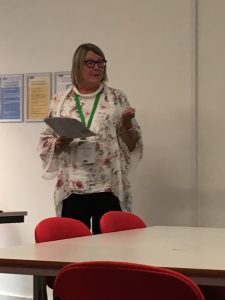
ALT-C: Professor Debbie Holley presenting
Dr Marketa Zezulkova, Charles University, Prague, has been leading the collaborative work on Digital toolkits with Bournemouth Universities Dr David Biggins and Professor Debbie Holley.
Session Description
The tensions of UK Higher Education environment metrics (cf Research Excellence Framework (REF), Teaching Excellence Framework (TEF) Knowledge Exchange Framework (KEF)) can be seen in drivers of digital change at institutional in UK Universities. The increasing measurement and importance of student outcomes and learning gain (TEF) requires institutions to show the impact of their work, both internally and across sector benchmarks.
It is within this context that we conducted a mixed method study exploring technology enhanced learning strategies and their applied frameworks and toolkits. The first two phases of research comprised a quantitative survey with 36 participants, subsequent content analysis and resulted in a draft framework (Biggins et al 2017). This framework has now been explored in the third and last phase through semi-structured interviews with the TEL leaders from seven UK HE institutions.
Our preliminary findings indicate that to meet the requirements and demonstrate the externally set indicators of educational quality, technology enhanced learning (or digital learning) strategies and toolkits are often developed without academic staff and students’ input. The three emerging themes relevant to the Participation through Learning Technology theme suggest that:
(1) Educators are seen as providers rather than end users. The perceived TEL benefits for students have no or less comparable benefits in terms of the educators’ work and life, a change in this policy could impact institutions in terms of the UK Teaching Excellence Framework criteria Teaching Quality (TQ2) valuing teaching.
(2) Students are treated as receivers and users, rather than active participants in institutional TEL strategies and developments, a change in this policy in institutions has the possibility to address the Teaching Excellence Framework Employability and Transferable Skills Student Outcomes and Learning Gain (SO2), in terms of ‘ students acquire knowledge…that enhances their personal/professional life’
(3) Immediate students’ learning is prioritised over both educators’ and students’ life-long learning and digital capability/competence/literacies development. Here we argue that students of course need to develop skills that prepare them the world of work, but there is wider societal benefit in overcoming the digital divide. Our research suggests the Teaching Excellence Framework policy driver of Employment and Further Study (SO1) encourages a short term perspective of ‘students achieve their educational and professional goals, in particular….to highly skilled employment.’
Session content: evaluation and reflection
Drawing upon these findings, this paper will argue that HE institutions should acknowledge digital capability or competence as a life skill equally important for educators as well students (Beetham 2011; Vuorikari et al 2016; Holley 2017) and consequently provide a space for their meaningful participation (Yanchar 2018) in the development of digital learning strategies.
In our case studies, the UK HE institutions do value academic staff and students’ active involvement and feedback, however, this is not a formal long-term participatory approach, which would enable meaningful dialogue during the decision-making processes. Of interest to the ALT audience, our research discovered a number of emerging initiatives at some of the institutions involved in the research.
This talk will therefore draw upon the overall research findings, as well as these practical examples, while exploring the possibilities afforded by the shift from a top down, measured and managed set of internal drivers to what we term the ‘upside down’ approach. We will explore the potential value of this participatory approach to the UK HE institutions while gaining traction in an environment driven by external metrics and benchmarks, as well as to the academic staff and students from the point of view of their confidence, capacity and wellbeing.
References
Beetham, H., 2011. Digital Literacy Anatomised: Access, skills, and practices. [online] Joint Information System Committee (JISC) Design Studio. Available at:
Biggins, D., Holley, D., Evangelinos, G. and Zezulkova, M., (2017). Digital Competence and Capability Frameworks in the Context of Learning, Self-Development and HE Pedagogy. In: E-Learning, E-Education, and Online-Training (ELEOT) Third International Conference. Dublin, Ireland, pp.46–53. doi: 10.1007/978-3-319-49625-2_6
Holley, D (2017) Bournemouth University: a new vision for learning case study in JISC Developing organisational approaches to digital capability JISC 4 May 2017
https://www.jisc.ac.uk/guides/developing-organisational-approaches-to-digital-capability/
Vuorikari, R., Punie, Y., Carretero Gomez, S., and Van den Brande, G., 2016. DigComp 2.0: The Digital Competence Framework for Citizens. Update Phase 1: the Conceptual Reference Model. European Commission, 2017 [online] Available at:
Yanchar, S.C., 2018. Agency, World, and the Ontological Ground of Possibility. Journal of Theoretical and Philosophical Psychology, 38(1), 1–14.
The presentation is avilable on slideshare:









